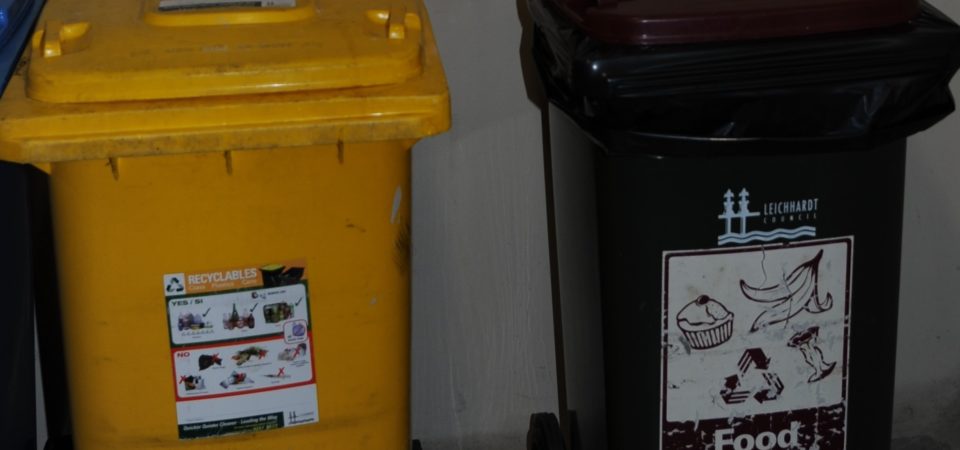Reducing the amounts of food and other organic waste going to landfill is a good idea and one that should not be difficult to implement. Any reduction in landfill volume will decrease the time, effort and energy required to move it around, and prolong the life-spans for areas set aside for our human garbage. It is also possible to allow organic waste, including discarded food material and garden material, to turn into compost, which can then be applied as fertilizer where required. Thus the food we eat, the gardens we grow, the lawns we mow etc. can be recycled into more food, gardens, parks, and so on. All we have to do is collect and process it all.
It turns out, however, that there may be some significant problems with collection of food waste, as illustrated by the Leichhardt Council scheme described in the Brink article by Wendy Frew. Here is my personal experience based on living in this municipality since 2008, in two apartment buildings, both with bins for organic food waste.
My observations and suggestions are as follows:
Little to no information provided to residents since the scheme was introduced in 2007
If residents of apartment buildings are to make good use of ‘organics’ bins and hence contribute to the overall scheme in regard to food waste, they need to be informed at least in terms of the aims and significance of the program, how the scheme works and how they can contribute. If communication with residents were via email, this could be done simply and easily.
Decreasing provision to residents of biodegradable bags suitable for collecting food waste
It is possible to purchase biodegradable bags, which is what we now do. It would also be possible, and not overly expensive, for the building managers to conveniently provide such bags in the ‘garbage rooms’ where the ‘organics’ and other bins are located.
Utilization of ‘organics’ bins has declined to low current levels
This seems hardly surprising, given the lack of information, encouragement and biodegradable bags.
Significant ‘contamination’ of ‘organics’ bins with non-organic material
This seems similarly unsurprising. It is apparently also a function of where the bins for ‘organics’ and other recycled items are located. In my present building, the organics bin was frequently receiving general garbage when it was the closest bin to the entrance of the garbage room. This contamination decreased markedly when I moved this bin, along with its signage, further away and next to the other recycle bins. The first encountered bins are now two for general garbage. How simple was that!
Noticeable differences between apartment buildings in terms of use of ‘organics’ bins
It is not clear why there would be the differences between buildings that I have observed. However, one potential way to increase participation across all buildings, after dealing with the issues identified above, would be to provide residents of each building with information comparing their participation with that in the other buildings and elsewhere. If people get involved in a ‘competition’, it can increase their participation.
It is immediately apparent that the issue of recycling organic food waste involves environmental, economic, and social issues. Environmental issues arise because of the adverse consequences of expanding landfill, loss of significant ‘nutrients’ such as phosphorus, and so on. As always, the program will no doubt have to be considered ‘financially viable’, based on perceived costs and benefits. It will also have to be socially acceptable and to fit reasonably easily into peoples’ lives. Only if all these issues are resolved, can the program continue and flourish.
In the meantime, my family and I shall continue to participate as long as possible.
MAHB-UTS Blogs are a joint venture between the University of Technology Sydney and the Millennium Alliance for Humanity and the Biosphere. Questions should be directed to joan@mahbonline.org
MAHB Blog: https://stagingphp.com/mahb/blog/reducing-food-waste/
The views and opinions expressed through the MAHB Website are those of the contributing authors and do not necessarily reflect an official position of the MAHB. The MAHB aims to share a range of perspectives and welcomes the discussions that they prompt.
